Related Research Articles

The National Baseball Hall of Fame and Museum is a history museum and hall of fame in Cooperstown, New York, operated by private interests. It serves as the central point of the history of baseball in the United States and displays baseball-related artifacts and exhibits, honoring those who have excelled in playing, managing, and serving the sport. The Hall's motto is "Preserving History, Honoring Excellence, Connecting Generations". Cooperstown is often used as shorthand for the National Baseball Hall of Fame and Museum.

Major League Baseball (MLB) is a professional baseball league and the highest level of organized baseball in the United States and Canada. One of the big four major leagues, MLB comprises 30 teams, divided equally between the National League (NL) and the American League (AL), with 29 in the United States and 1 in Canada. Formed in 1876 and 1901, respectively, the NL and AL cemented their cooperation with the National Agreement in 1903, making MLB the oldest major professional sports league in the world. They remained legally separate entities until 2000, when they merged into a single organization led by the Commissioner of Baseball. MLB is headquartered in Midtown Manhattan.
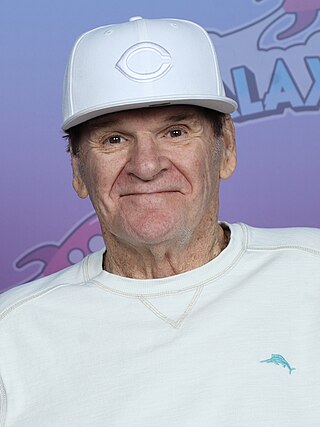
Peter Edward Rose Sr., also known by his nickname "Charlie Hustle", is an American former professional baseball player and manager. Rose played in Major League Baseball (MLB) from 1963 to 1986, most prominently as a member of the Cincinnati Reds lineup known as the Big Red Machine for their dominance of the National League in the 1970s. He also had a successful stint playing for the Philadelphia Phillies, where he won his third World Series, as well as a brief stop with the Montreal Expos. During and after his playing career, he served as the manager of the Reds from 1984 to 1989.
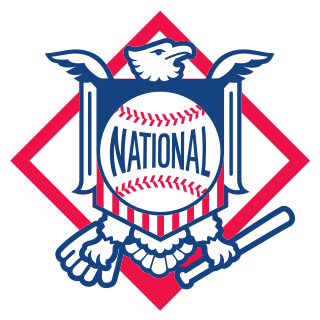
The National League of Professional Baseball Clubs, known simply as the National League (NL), is the older of two leagues constituting Major League Baseball (MLB) in the United States and Canada, and the world's oldest extant professional team sports league. Founded on February 2, 1876, to replace the National Association of Professional Base Ball Players (NAPBBP) of 1871–1875, the NL is sometimes called the Senior Circuit, in contrast to MLB's other league, the American League, which was founded 25 years later and is called the "Junior Circuit". Both leagues currently have 15 teams.
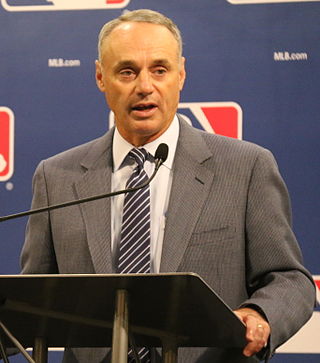
The commissioner of baseball is the chief executive officer of Major League Baseball (MLB) and the associated Minor League Baseball (MiLB) – a constellation of leagues and clubs known as "organized baseball". Under the direction of the commissioner, the Office of the Commissioner of Baseball hires and maintains the sport's umpiring crews, and negotiates marketing, labor, and television contracts. The commissioner is chosen by a vote of the owners of the teams. The incumbent MLB commissioner is Rob Manfred, who assumed office on January 25, 2015.

In baseball, the umpire is the person charged with officiating the game, including beginning and ending the game, enforcing the rules of the game and the grounds, making judgment calls on plays, and handling disciplinary actions. The term is often shortened to the colloquial form ump. They are also sometimes nicknames as blue due to the tradtional color of the uniform worn by umpires. Although games were often officiated by a sole umpire in the formative years of the sport, since the turn of the 20th century, officiating has been commonly divided among several umpires, who form the umpiring crew. The position is analogous to that of a referee in many other sports.
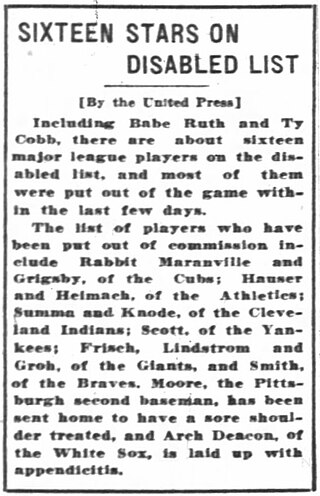
In Major League Baseball (MLB), the injured list (IL) is a method for teams to remove their injured players from the roster in order to summon healthy players. Before the 2019 season, it was known as the disabled list (DL).
The 1994–95 Major League Baseball strike was the eighth and longest work stoppage in Major League Baseball (MLB) history, as well as the fourth in-season work stoppage in 22 years. The strike began on August 12, 1994, and resulted in the remainder of that season, including the postseason and the World Series, being canceled. This was the first time in ninety years, since 1904, that a World Series was not played. The strike was suspended on April 2, 1995, after 232 days, making it the longest such stoppage in MLB history and the longest work stoppage in major league professional sports at the time.
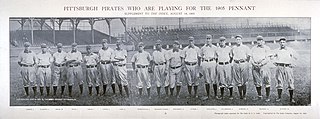
A Major League Baseball roster is a list of players who are allowed, by league agreement, to play for a Major League Baseball (MLB) team. Each MLB team maintains two rosters: an active roster of players eligible to participate in an MLB game, and an expanded roster encompassing the active roster plus additional reserve players.
Major League Baseball transactions are changes made to the roster of a major league team during or after the season. They may include waiving, releasing, and trading players, as well as assigning players to minor league teams.

The Major League Baseball draft is the primary mechanism by which Major League Baseball (MLB) assigns amateur baseball players from high schools, colleges, and other amateur baseball clubs to its teams. The draft order is determined by a lottery system, starting in 2023, where teams that did not make the postseason in the previous year participate in a state-lottery style process to determine the first six picks. The team with the worst record has the best odds of receiving the first pick. Prior to 2023, the draft order was based on the previous season's standings, with the worst team selecting first.

Robert Allan Davidson is a former umpire in Major League Baseball (MLB). Nicknamed "Balkin' Bob" and "Balk-a-Day Bob" for his tendency to liberally invoke baseball's balk rule, Davidson was an umpire on the National League (NL) staff from 1982 to 1999, and he was on the combined MLB umpiring staff from 2005 to 2016. He worked one World Series (1992) and several other postseason series.

The Mexican Baseball League is a professional baseball league based in Mexico. It is the oldest running professional sports league in the country.
Some team sports put players on different official lists according to circumstances for that player, for example if they are injured. There can be different rules for players on different lists, and the details vary between sports.
In professional sports within the United States and Canada, a trade is a sports league transaction between sports clubs involving the exchange of player rights from one team to another. Though player rights are the primary trading assets, draft picks and cash are other assets that may be supplemented to consummate a trade, either packaged alongside player rights to be transferred to another team, or as standalone assets in exchange for player rights and/or draft picks in return. Typically, trades are completed between two clubs, but there are instances where trades are consummated between three or more clubs.
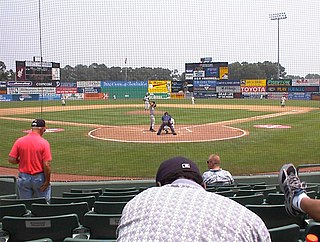
Single-A, formerly known as Class A and sometimes as Low-A, is the fourth-highest level of play in Minor League Baseball in the United States, below Triple-A, Double-A, and High-A. There are 30 teams classified at the Single-A level, one for each team in Major League Baseball (MLB), organized into three leagues: the California League, Carolina League, and Florida State League.

Minor League Baseball (MiLB) is a professional baseball organization below Major League Baseball (MLB), including teams affiliated with MLB clubs.

Baseball personnel have cheated by deliberately violating or circumventing the game's rules to gain an unfair advantage against an opponent. Examples of cheating include doctoring the ball, doctoring bats, electronic sign stealing, and the use of performance-enhancing substances. Other actions, such as fielders attempting to mislead baserunners about the location of the ball, are considered gamesmanship and are not in violation of the rules.
References
- ↑ Baccellieri, Emma (January 14, 2020). "The Meaning Behind MLB's Unprecedented Astros Punishment". Sports Illustrated . Retrieved May 2, 2021.
- ↑ The Official Professional Baseball Rules Book (PDF). New York City: Office of the Commissioner of Baseball. 2019. Archived from the original (PDF) on July 31, 2019 – via Wayback Machine.
- ↑ The Official Professional Baseball Rules Book (PDF). New York City: Office of the Commissioner of Baseball. 2021. Archived from the original (PDF) on November 27, 2023. Retrieved May 1, 2021– via mlbpa.org.
- ↑ The Official Professional Baseball Rules Book (PDF). New York: Office of the Commissioner of Baseball. 2024. Archived from the original (PDF) on May 26, 2024. Retrieved September 20, 2024– via agent.mlbplayers.com.